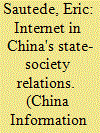| Srl | Item |
| 1 |
ID:
129448


|
|
|
|
|
| Publication |
2013.
|
| Summary/Abstract |
This article explores how state and society relations have been affected by the development of information technology in China over the past 20 years. It argues that despite all the transformative changes that such technology has helped bring about, 'benefits' have to be weighed in terms of both empowerment of society and strengthening of state capacity. Ultimately, the digital challenge has not translated into a weakening of the authoritarian state, and this can be explained by the very nature of the party-state in China and how it has managed to make use of communication tools that prove to be both constructive and divisive.
|
|
|
|
|
|
|
|
|
|
|
|
|
|
|
|
| 2 |
ID:
177135


|
|
|
|
|
| Summary/Abstract |
Although various studies have investigated public acceptance of nuclear power development, they have failed to discuss the effectiveness of different communication tools adopted by local governments and companies to gain public support, let alone whether their effectiveness varies from person to person according to his or her knowledge level. The purpose of this paper is to examine the role of different communication tools (i.e., scientific education, station visiting, community building, and national strategy advertising) adopted in the nuclear deployment practice in China and to investigate their interactions with people's knowledge level in the formation of public acceptance. Based on a sample of 322 valid questionnaires in Haiyan County, Zhejiang Province, we found that emphasizing nuclear development as national strategy is the most powerful instrument for enhancing acceptance of nuclear power by residents with both high and low knowledge levels, but it is more effective for those who have less knowledge. A communication tool of scientific education is more useful to residents with more knowledge, whereas trust-building tools function well for those with less knowledge. The results imply that policy makers should design various tools targeted at different groups of residents based on their knowledge level and decision-making process.
|
|
|
|
|
|
|
|
|
|
|
|
|
|
|
|